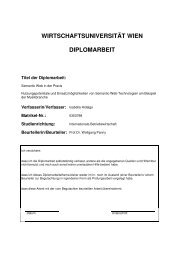Wirtschaftsuniversität Wien Magisterarbeit - SemanticLab
Wirtschaftsuniversität Wien Magisterarbeit - SemanticLab
Wirtschaftsuniversität Wien Magisterarbeit - SemanticLab
You also want an ePaper? Increase the reach of your titles
YUMPU automatically turns print PDFs into web optimized ePapers that Google loves.
users behavior” and found that “[...] when privacy policy comparison information is<br />
readily available, individuals may be willing to seek out more privacy friendly web sites<br />
and perhaps even pay a premium for privacy depending on the nature of the items to<br />
be purchased” [Gid06].<br />
2.3.3. Search engines<br />
When it comes to search engines, privacy plays an important role because for Internet<br />
users they are a vital part of their daily routine. In this context the threat to privacy<br />
shows different characteristics:<br />
• Personalization and customization as already described in the sections above<br />
• Creation of user profiles for improving search quality<br />
• General data mining capabilities of search engines<br />
The question of personalization and customization has already been discussed above,<br />
based on the example of iGoogle. However, there are more threats to privacy when it<br />
comes to the usage of search engines. One such threat is the creation of user profiles<br />
for improving search quality. [Xu07] describes an experiment where it was shown that<br />
providing personal, sensitive data improves the quality of search results. This is due to<br />
the fact that by providing information about one’s preferences or other characteristics<br />
the search engine is able to filter unsuitable search results. If users are male and under<br />
30 years of age for example and they provide this information, they will probably get<br />
better search results if searching for swimsuits simply because the search engine can filter<br />
out all websites which provide information about female swimsuits. Once provided, this<br />
information is probably stored for an undetermined amount of time. However, users are<br />
able to deny such information if they want to.<br />
Despite creating user-profiles, there is also another technology which, if mis-used, can<br />
pose a threat to privacy called data mining. [Han01] defines data mining as “the analysis<br />
of [...] observational data sets to find unsuspected relationships and to summarize the<br />
data in novel ways that are both understandable and useful to the data owner”. In the<br />
case of search engines this leads to incidents such as the scandal where AOL published<br />
a database of anonymised search records for scientific use. Unfortunately, they were not<br />
used for scientific purposes only which, shortly after the publication, led to whole user<br />
profiles being published on the Internet [CNT06]. Although such big incidents rarely<br />
occur, they clearly highlight the capabilities of search engines to collect the data of its<br />
users and, once processed and interpreted, how such data can be abused. However,<br />
these threats are not only applicable for the actual users of search engines, but also<br />
for everyone who published content on the Internet without proper knowledge of its<br />
technologies such as web-crawlers 3 . These web-crawlers collect data by indexing billions<br />
of websites if not explicitly locked out from the website. Over time, search engines can<br />
3 Web-crawlers are programs sent by search engines to “crawl” from website to website to index them<br />
and hence make them available in the database of a search engine<br />
11





